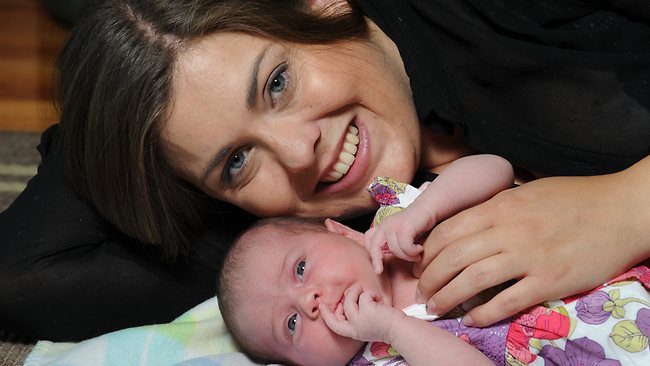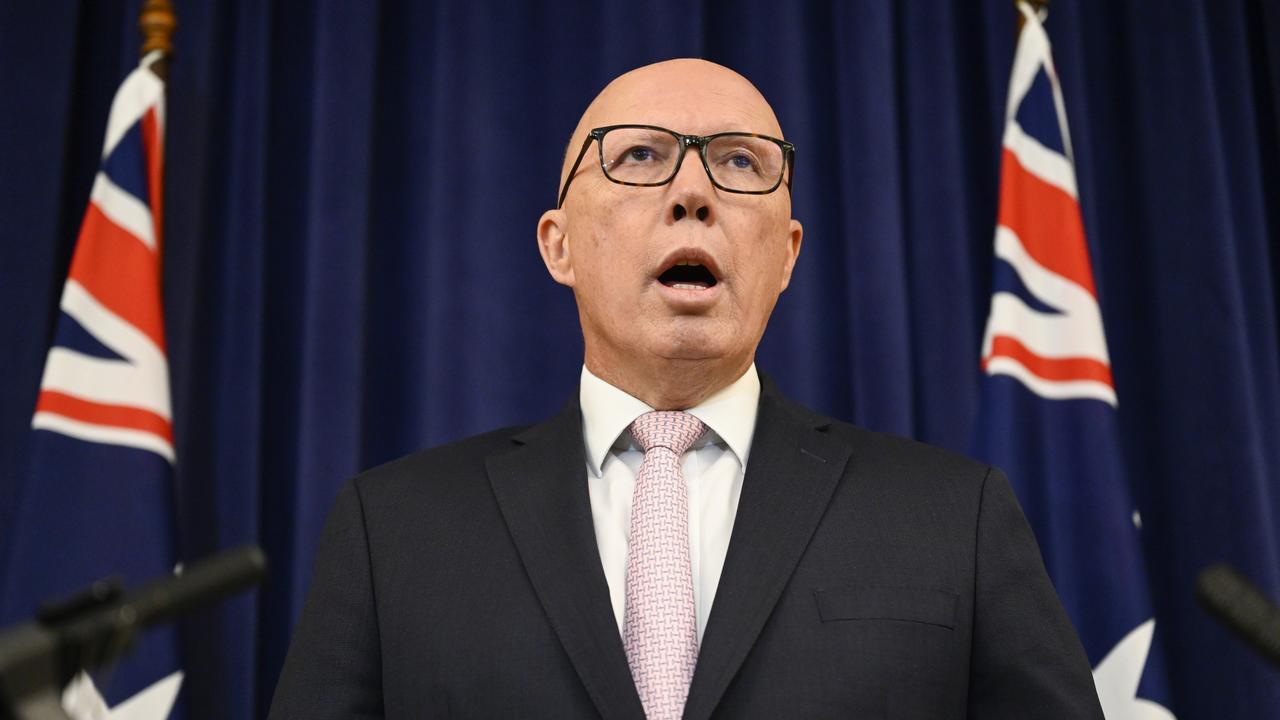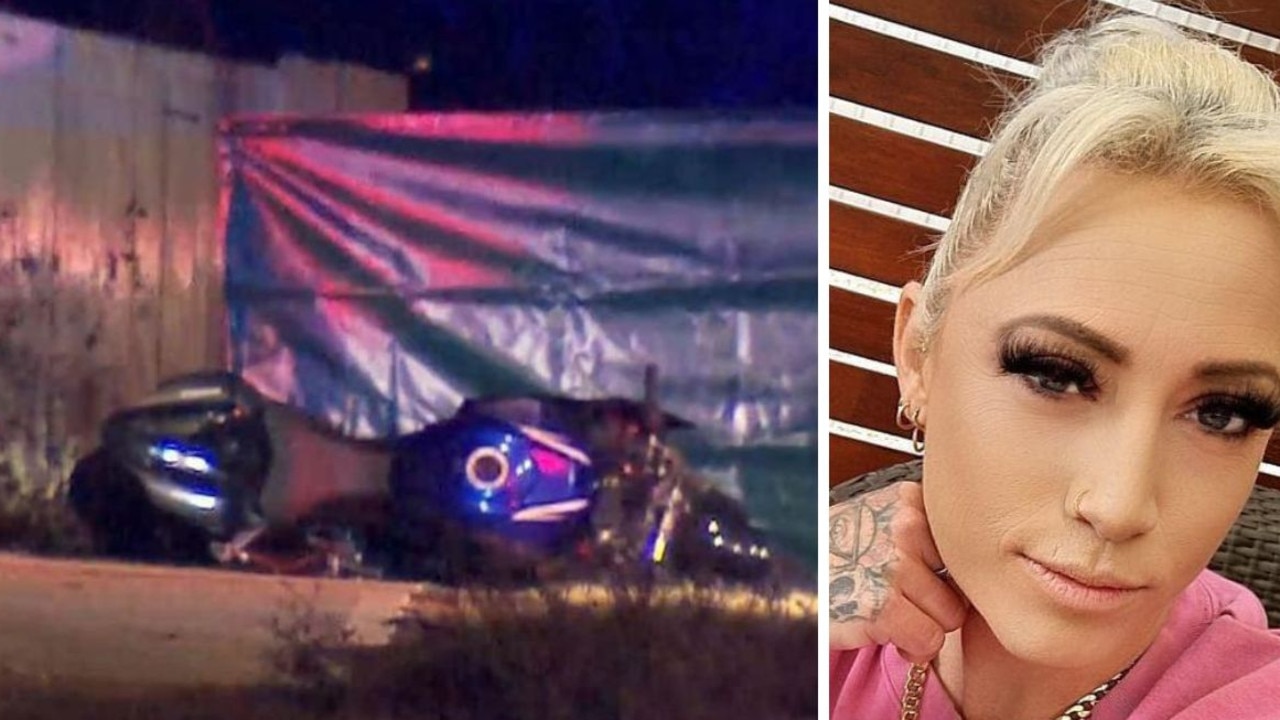With technological advances, most premature babies survive against the odds
THEY are the tiny babies, sometimes weighing less than a kilogram, who cling perilously to life during their first days, weeks and months.

THEY are the tiny babies, sometimes weighing less than a kilogram, who cling perilously to life during their first days, weeks and months.
Each year thousands of Australian infants - about 8 per cent - are born premature, before their mother reaches the 37th week of pregnancy.
Many enter the world much earlier, at 23 or 24 weeks, and are increasingly surviving and thriving thanks to advances in technology.
At the Women's and Children's Hospital neonatal ward, up to 60 premature babies can be treated at any one time.
It's a similar story at the Flinders Medical Centre, where 40 tiny infants lie hooked up to monitors in sophisticated cribs at any given time as their parents anxiously watch on.
Flinders Medical Centre neonatal medicine director Associate Professor Peter Marshall says the centre treats 1110 premature babies on average each year.
Of these, about eight don't survive, a number Assoc Prof Marshall says has dropped considerably in the three decades he has worked with some of South Australia's most fragile residents.
"Below 28 weeks was generally considered to be a high risk for an infant and before that it was below 32 weeks," he says.
"But, today, the borderline area has dropped to 23 to 25 weeks.
"Even so at that borderline of liability ... we need to be aware that there are serious risks of long-term disability."
Women's and Children's Hospital state director of neonatal medicine Dr Andy McPhee says new approaches to lung disease, nutrition and infection control are among the main reasons "premmies" face improved outcomes.
"Little babies have got an extraordinary capacity to recover and do well," Dr McPhee says.
"So although we have some sad outcomes, we have some terrific ones.
"And even with the sad outcomes, there can sometimes be a small positive. People thrive in adversity, it's amazing how families pull together. It's a reaffirmation of the human spirit."
Dr McPhee agrees that 23 weeks tended to be the "line in the sand" and the earlier a child is born, the more likely parents are faced with the devastating decision of whether to stop treating their child.
"We rely a lot on parents' views on what we should do," he says. "Unfortunately, in a lot of situations, you haven't got a week to sit down and chat."
Woodcroft mother Jenny Joy's first son Matthew was born full-term but had several complications including a low pulse, and her second son Ben, now six, was born at 32 weeks and spent six weeks in hospital.
She created a group, Women Who Have Been There, to support other parents of premature or sick babies.
"We set up playgroups and morning teas, visit the neonatal unit, all sorts of things where mums and dads who have had similar experiences can get together," she says.
"It's not all positive, there are those who have babies who didn't make it and we just let them know we're here and give them a chance to talk, a shoulder to lean on."
----------

>> Laura and Simon Noble's twins, Kason and Cohen, were born at 34 weeks
"I was 13 weeks' pregnant when we discovered we were expecting identical twins," Laura says.
"Five weeks later, my husband Simon and I moved from Auckland, New Zealand, to Adelaide.
"We didn't know anyone and our closest family was in Queensland.
"Other than really bad morning sickness, my pregnancy went well until 34 weeks when I was diagnosed with obstetric cholestasis.
"Despite the medication I was put on, my bloods showed my bile salt levels were still rising.
"I was called into the hospital for monitoring. I had more tests, which showed I also had severe pre-eclampsia and HELLP syndrome - a life-threatening obstetric complication.
"I called Simon at work and told him he needed to come to the hospital as the obstetrician had made it very clear that our twins had to be born as soon as possible.
"I had to have an emergency caesarean under a general anaesthetic."
Kason Eligh was born at 7.52pm weighing 2065g and needed help to breathe.
Cohen Asher was born at 7.53pm weighing 2140g.
"I met my babies just before lunchtime the next day," Laura recalls.
"They were both off their monitors and IV drips by the end of day three.
"After some temperature instability, they finally graduated to open cots on day 10.
"I loved that day - it meant I got to cuddle them as much as I could and give them their first baths.
"The boys now are very adventurous and chilled out two-year-olds.
"They are doing so well, and you would never know they were born prematurely."
----------
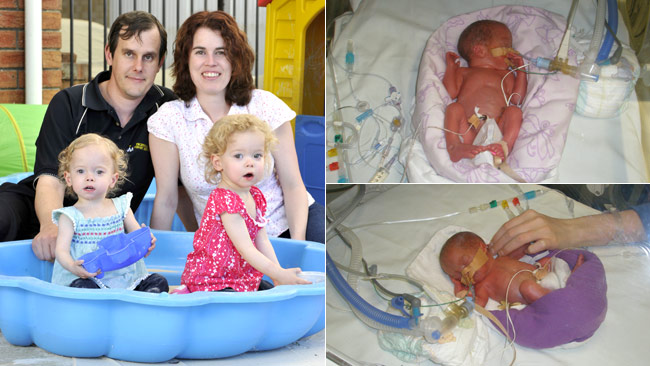
>> Caroline and Craig Scrimshaw's twin daughters, Holly and Miranda, were born at 26 weeks and spent more than 120 days in hospital
"Our journey through the Flinders Medical Centre neonatal unit began with a membrane rupture and a fast trip to hospital," Caroline recalls.
"My husband, Craig, and I spent three days in the birthing unit, while attempts were made to hold on a little longer.
"But, despite everyone's best efforts, our girls were determined to meet us. And they did.
"On September 13, 2010 Holly Alanna and Miranda Lee were born at 26 weeks gestation and weighing 700g and 990g.
"We saw them briefly in the moments after their birth, before they were whisked away by the neonatal team to the neonatal intensive care unit.
"The days that followed were a blur. All of a sudden we were parents to two tiny girls with a whole list of medical issues.
"It was a tough beginning for them and a stressful time for us as we adjusted to our new role as parents.
"I remember my head spinning with the sheer volume of medical information we were bombarded with.
"Dealing with everything, including the grief and guilt after having a premature labour was difficult.
"Thanks to the stress of it all, Craig and I ended up with bad head colds.
"The girls were barely a week old and we couldn't be with them.
"We had our good days and horrible days. One day the girls would be doing really well and the next, one or both would take a giant leap backwards.
"The most difficult part of the whole experience for me was leaving them behind each night.
"Generally the girls were kept close together, for their benefit as well as ours.
"But, for a couple of weeks, Miranda was in level 2 and Holly in level 3.
"Even though they were only separated by a wall, it felt like I had been torn in two.
"One huge help came from some of our friends.
"They got together and cooked us meals for the freezer, so we didn't have to worry about cooking.
"We had some pretty great nurses looking after our girls and I learnt a lot from them.
"When our girls came home in early January, Holly still had her feeding and oxygen tubes and the lovely oxygen machine came too.
"Within a week, Holly was back in hospital thanks to a bad reaction to her formula.
"But, after a brief stay and a change in formula, she came home without oxygen and a much happier girl.
"They are now happy and active."
----------
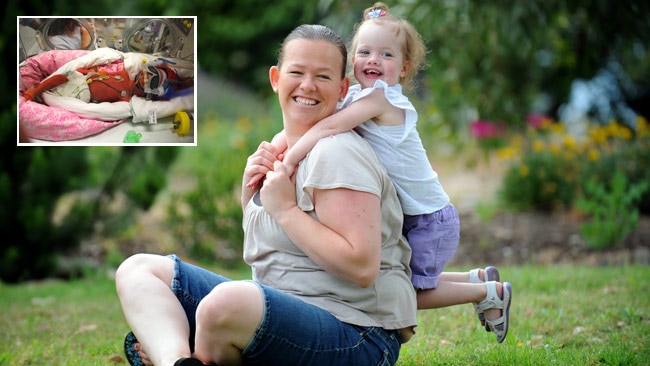
>> Sarah Pacey and James Taylor's daughter, Chelsea, was born 10 weeks early
"There wasn't really any indication I'd have Chelsea early until I went for a regular check-up with my midwife when I had 10 weeks to go," Sarah recalls.
"She said I was starting to show signs of pre-eclampsia (high blood pressure during pregnancy).
"I stayed in hospital for the next two days. For the first few hours I thought everything was OK, that I'd be going home soon, but within a few hours it had changed around.
"On the second day, they decided I needed to have an emergency caesarean and Chelsea was born.
"Luckily, she was born healthy, but small, weighing 1.4kg.
"We spent the first seven weeks in hospital but we actually came out before she was due - most people say you come out at the due date.
"Each day we did the 'millk shuttle express', where I took the milk I expressed in.
"Chelsea now has her regular check-ups and the only ongoing things she has are asthma and eczema, and they were things she could have had if she was full term anyway.
More Coverage
"I also go to playgroups with a group called Miracle Babies, which the other mums of premmies attend."
----------
>> To buy a copy of Our Stories, featuring the Noble and Scrimshaw families' tales and compiled by Women Who Have Been There, email jenny@womenwhohavebeenthere.com.au to order your copy. The book is $15 and $2 from each sales goes towards the Flinders Medical Centre's Neonatal Unit.

